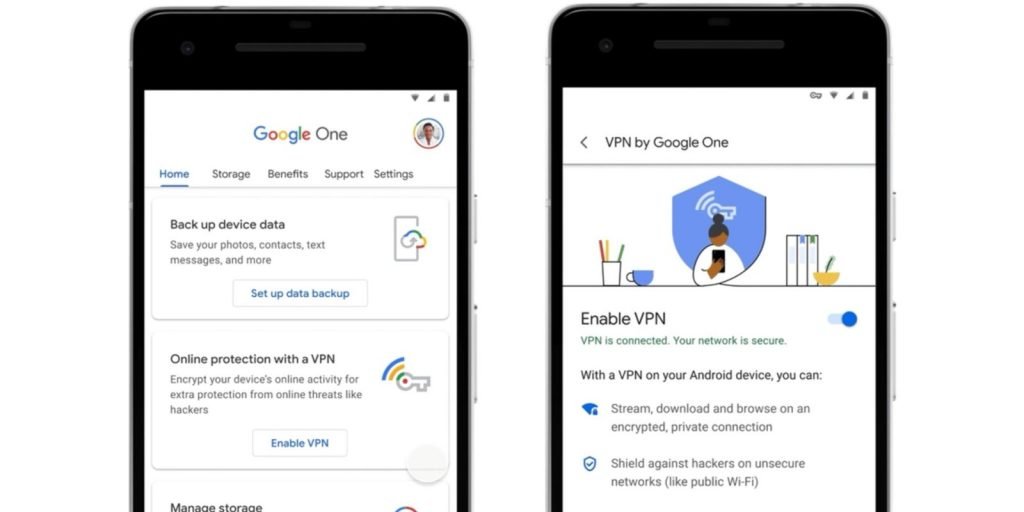Google recently announced that they were launching their very own VPN service, which will be marketed as a perk for consumers who already subscribe to the 2TB plan on Google One, the company’s cloud storage software.
The decision by Google to offer a VPN is certainly interesting, for a number of reasons. A VPN provides increased privacy to internet users, which is not exactly an understood aim of Google’s business model. Search engines thrive off user information; they are able to use it to tailor personalised ads and create an individual experience to attract internet browsers back to use their service. A VPN will take that power away.
This product and situation presents a perfect example as to why it is important to conduct thorough research on internet security providers before signing up to a service. If your aim is to increase your web privacy, you should really know where your data and personal information is going.
A VPN is also known as a virtual private network, and is a tool that can grant additional security whilst browsing the web.
A VPN will mask your Internet Protocol (IP address) from prying eyes which can include your internet service provider, the search engine you are using and any third parties (including cybercriminals) who may be monitoring your online actions. Whilst using a VPN, your data is also encrypted so not only is your location secure but any information that is passed over that connection is also entirely masked.
Why should I use a VPN?
VPNs are now considered to be a must-have internet security tool and web users should consider installing one on all of their connected devices.
VPNs are particularly important should you be accessing the web via a public WI-FI connection, which many of us do on a daily basis. It may seem convenient to check your bank balance or book an online medical appointment whilst using a cafe’s free WI-FI but these types of connections are usually not secure. Anyone could be eavesdropping on your conversations, accessing your personal information and using your data for their own benefit.
A VPN will provide a secure connection at all times, protecting your privacy and ensuring any personal information you provide whilst online is encrypted.
What should I look for in a VPN?
If you are looking for a VPN in Australia, there are a lot of options out there and it can be difficult to narrow down your options.
The first step is to decide what you need a VPN for. Whilst privacy is the answer for many of us, VPNs offer a broader range of benefits including the ability to bypass geo-blocking restrictions (so you can stream entertainment services from other countries) and also prevent e-commerce sites (such as airlines) from raising their prices as they track your search movements.
Your choice will also depend on the number of devices that you wish to connect to. Should you wish your entire household to be protected, it may be best to select a router-based VPN which will provide a secure connection to all users on that network. If you are a frequent traveller, it may be a better option to go with an app-based VPN for your phone and tablet.
Before signing up to any service, make sure to read the fine print. Ensure that the provider does not track your movements, store your data or sell personal information onto third-parties. Be particularly wary of free VPNs — whilst they may seem to be an attractive option, your privacy is unlikely to be their number one concern. There have been many reports of free VPN services being infiltrated by cybercriminals, with users’ data hacked and sold on the dark web.
Should I trust Google’s VPN?
Google has stated that privacy and security is at the core of everything they do, including the development of their new VPN service. They promise that they will never use a VPN connection to track, log or sell browser activity and that their client libraries are open sourced, meaning they are very transparent about the type of technology they are using.
This all sounds very promising however it’s important to remember that the whole purpose of a VPN is to prevent companies like Google from accessing your data. Google’s business model is based upon surveillance — whilst they may seem to promise complete security and privacy, you would be right to be a little wary of why they would want to offer VPN services to their users.
It goes without saying that you should certainly be using a VPN for all your online connections, however there is little point investing your money in a service if you do not trust their ability to keep your data and activities private. Always do your research before handing your personal information over to any kind of company and make the most of secure, reputable and proven VPN service providers.
Author Bio:
Bridget is a writer and editor, currently living in Melbourne. She is a copywriter for Newpath Web and loves working with words of all shapes and sizes. When not playing around with punctuation and grammar, she enjoys travelling and curating her Spotify playlists.

